高中英语必修一unit2知识点复习归纳
高中英语必修1 Unit2重点词汇和句子
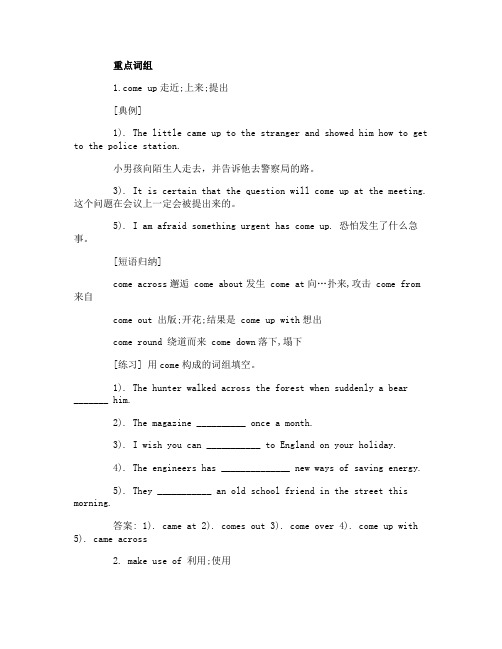
重点词组e up走近;上来;提出[典例]1). The little came up to the stranger and showed him how to get to the police station.小男孩向陌生人走去,并告诉他去警察局的路。
3). It is certain that the question will come up at the meeting. 这个问题在会议上一定会被提出来的。
5). I am afraid something urgent has come up. 恐怕发生了什么急事。
[短语归纳]come across邂逅 come about发生 come at向…扑来,攻击 come from 来自come out 出版;开花;结果是 come up with想出come round 绕道而来 come down落下,塌下[练习] 用come构成的词组填空。
1). The hunter walked across the forest when suddenly a bear_______ him.2). The magazine __________ once a month.3). I wish you can ___________ to England on your holiday.4). The engineers has ______________ new ways of saving energy.5). They ___________ an old school friend in the street this morning.答案: 1). came at 2). comes out 3). come over 4). come up with 5). came across2. make use of 利用;使用[典例]1). You ought to make good use of any opportunity to practise English. 你应该好好利用机会练习英语。
外研版(2019)高中英语必修第一册Unit 2课文知识点讲义
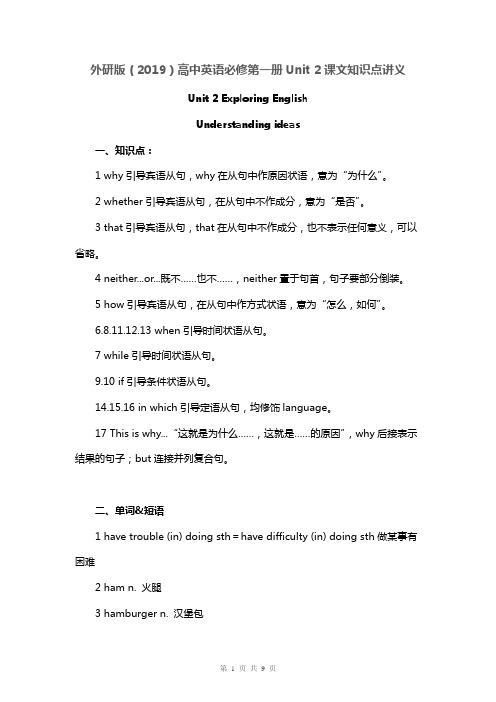
外研版(2019)高中英语必修第一册Unit 2课文知识点讲义Unit 2 Exploring EnglishUnderstanding ideas一、知识点:1 why引导宾语从句,why在从句中作原因状语,意为“为什么”。
2 whether引导宾语从句,在从句中不作成分,意为“是否”。
3 that引导宾语从句,that在从句中不作成分,也不表示任何意义,可以省略。
4 neither...or...既不……也不……,neither置于句首,句子要部分倒装。
5 how引导宾语从句,在从句中作方式状语,意为“怎么,如何”。
6.8.11.12.13 when引导时间状语从句。
7 while引导时间状语从句。
9.10 if引导条件状语从句。
14.15.16 in which引导定语从句,均修饰language。
17 This is why...“这就是为什么……,这就是……的原因”,why后接表示结果的句子;but连接并列复合句。
二、单词&短语1 have trouble (in) doing sth=have difficulty (in) doing sth做某事有困难2 ham n. 火腿3 hamburger n. 汉堡包4 eggplant n. 茄子5 pine n. 松树6 pineapple n. 菠萝7 sculpt v. 雕刻,雕塑8 sculpture n. 雕刻作品,雕像9 seasick adj. 晕船的10 airsick adj. 晕机的11 carsick adj. 晕车的12 homesick adj. 想家的13 speak of...谈起,提到(引入最近谈到过的一个话题)14 opposite n. 对立面,对立物,相反的人/ 事物adj.对面的,相对的,对立的15 opposing adj. 相反的,对立的16 harmless adj. 无害的,不致伤的17 harmful adj. (尤指对健康或环境)有害的,导致损害的18 shameless adj. 无耻的,不知羞耻的19 shameful adj. 可耻的,丢脸的20 behavior n.举止,行为21 sunshine n.阳光22 confusing adj.令人困惑的23 capitalized adj.大写的24 medical adj.医学的,医疗的25 wonder v.惊奇,想知道26 unique adj.独一无二的,独特的27 burn up 烧毁,烧尽28 burn down (建筑物)(被)烧毁29 fill in填(写),填补,代替,淤塞30 form n.表格,形式v.形成31 fill out填写(表格等)32 alarm n.警报器,闹钟33 reflect v.显示,反映34 creativity n.创造性,创造力35 visible adj.看得见的,可见的36 invisible adj.看不见的37 wind v.摇动(把手等),上发条wind up摇动(把手等);使(活动,会议等)结束三、课文Neither Pine nor Apple in PineappleHave you ever asked yourself (1) why people often have trouble learning English? I hadn' t, until one day my five-year-old son asked me (2) whether there was ham in a hamburger. There isn' t. This made me realize (3) that there' s no egg in eggplant either. (4) Neither is there pine nor apple in pineapple. This got me thinking (5) how English can be a crazy language to learn.。
高中英语 外研版必修第一册unit2语言知识点归纳整理

Unit 2 Exploring English1.have trouble(in) doing sth.做某事有困难/麻烦【词汇拓展】in trouble在危险、受罚、忧虑的处境中out of trouble摆脱麻烦;脱离困境get into trouble陷入困境;遇到麻烦get sb.into/out of trouble使某人陷入/摆脱困境take the trouble to do sth.不辞辛劳做某事;费神做某事have trouble with sth.做某事有困难/麻烦2.behavior n.举止;行为【词汇拓展】behave vt.& vi.举动;(举止或行为)表现behave well/badly to/towards sb.对待某人好/差behave oneself守规矩;表现得体well-behaved adj.表现好的badly-behaved adj.表现差的3.unique adj.独一无二的;独特的be unique to (某人、地或事物)独具的;特有的uniquely adv.独特地;与众不同地uniqueness n.独特性;唯一性4.burn up烧毁;烧尽【词汇拓展】burn down(建筑物)被烧毁burn away烧掉;逐渐烧掉;烧毁;消除burn out燃尽;熄灭;筋疲力尽5.reflect v.显示;反映【词汇精讲】reflect...in...在……中映出……的影像be reflected in倒映在;反映在reflect on/upon sth.反省/认真思考某事6.wind up 给(机械)上发条;使(活动、会议等)结束【词汇拓展】wind one’s way蜿蜒前进wind down放松一下wind up doing最终做;最终落得e across偶然遇到【词汇拓展】come about 发生,引起come out出版;出来come to来到;合计,总共是;苏醒过来come to an end结束come up with赶上;提出come into being形成;产生8.contact vt.联系;联络【词汇拓展】have contact with与……有联系stay/keep in contact with与……保持联系in contact with与……有联系lose contact with与……失去联系9.calm v(使)平静下来;(使)镇定下来【词汇拓展】calm(sb.) down (使某人) 平静下来;镇静下来remain/keep/stay calm 保持镇静calmly adv.镇静地;平静地calmness n.镇静;平静10.refer to查阅;参考;谈到;提及【词汇拓展】refer to...as...把……称作……refer...to...把……提交给……reference n.言及;提及;参考;查阅reference book参考书11.remind v.提醒;使想起【词汇拓展】remind sb.of sth.提醒某人某事remind sb.to do sth.提醒某人做某事remind(sb.) that/how/what...提醒(某人)……ment n.评论【词汇拓展】comment on/upon sth.对……发表评论comment that...评论……make comments on/about...对……加以评论no comment无可奉告13.exchange n.(学生、教师的)互访;交换【词汇拓展】in exchange (for...)作为交换(……)exchange student交换生exchange vt.交换exchange...for...用……交换……exchange sth.with sb.与某人交换某物14.intend v.计划,打算【词汇拓展】intend doing/to do sth.打算做某事intend sb.to do sth.打算让某人做某事had intended to do sth./intended to have done sth.本来打算做某事be intended to do sth./for sth./sb.专门为……;专门给……with an/the intention of 抱有……的目的;打算……14.recognise v.认识,辨认出【词汇拓展】recognise sb./one’s voice认出某人/听出某人的声音be recognised to be/as...被认为是……It is recognised that...人们公认……recognition n.认出;认识beyond(all) recognition认不出来15.aware adj.意识到的,明白的【词汇拓展】be aware that...意识到/体会到……awareness n.意识;认识develop an awareness of 逐渐懂得;培养……的意识Then he was aware that they were regarding him with interest.这时,他意识到他们都很感兴趣地在看着他。
高中英语必修一unit2知识点复习归纳
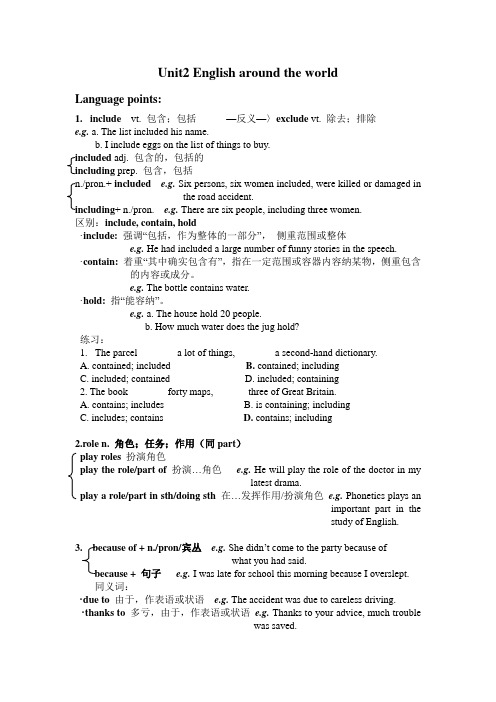
Unit2 English around the worldLanguage points:1.include vt. 包含;包括—反义—〉exclude vt. 除去;排除e.g.a. The list included his name.b. I include eggs on the list of things to buy.adj. 包含的,包括的prep. 包含,包括included e.g. Six persons, six women included, were killed or damaged inthe road accident.+ n./pron. e.g. There are six people, including three women.区别:include, contain, hold·include:强调“包括,作为整体的一部分”,侧重范围或整体e.g.He had included a large number of funny stories in the speech. ·contain:着重“其中确实包含有”,指在一定范围或容器内容纳某物,侧重包含的内容或成分。
e.g. The bottle contains water.·hold:指“能容纳”。
e.g. a. The house hold 20 people.b. How much water does the jug hold?练习:1.The parcel _______ a lot of things, _______ a second-hand dictionary.A. contained; includedB. contained; includingC. included; containedD. included; containing2. The book _______ forty maps, ______ three of Great Britain.A. contains; includesB. is containing; includingC. includes; containsD. contains; including2.role n. 角色;任务;作用(同part)play roles扮演角色play the role/part of 扮演…角色 e.g. He will play the role of the doctor in mylatest drama.play a role/part in sth/doing sth在…发挥作用/扮演角色e.g.Phonetics plays animportant part in thestudy of English.3. because of + n./pron/宾丛 e.g.She didn’t come to the party because ofwhat you had said.because + 句子 e.g. I was late for school this morning because I overslept.同义词:·due to 由于,作表语或状语 e.g. The accident was due to careless driving. ·thanks to多亏,由于,作表语或状语e.g. Thanks to your advice, much troublewas saved.·owing to 由于,作表语或状语e.g. Tom’s failing in the exam was owing to hiscarelessness.·as a result of由于,作状语e.g.The flight was delayed as a result of fog.·on account of 因为,作状语e.g. We delayed our departure on account of the badweather.·by reason of 由于,因为,作状语e.g.He was excused by reason of his age.4. native adj.&n.①adj. a. 出生地的b. 本地的,土生土长的c. (常与to连用)本地产的A是B地特产的动物或植物:A be native to B. = A be a native of B.d.(指品质)与生俱来的,天生的②n. 本地人,本国人,某地的动物或植物e.g. a. Her native tongue is German.b. Tom is a native Englishman.c. Banana is native to Taiwan.== Banana is a native of Taiwan.d. native speakerf. He is a native of Beijing.g. Are you a native here, or just a visitor?h. The panda is a native of west China.注:One’s native place 指某人的出生地,但表达“是某地人”时,习惯上不说“My native place is …..”而说“I was born in ……”拓展:n.国家,民族national adj. 国家的,国民的n(c). 侨民n. (u) 国籍(c)民族 e.g. the minority nationalities 各少数民族5. the road to the modern Englishto 为介词,类似的有:the entrance to the hallthe answer(n.) to the question answer(v.) the questionthe key to the doora road to successa journey/trip to Beijing a visitor to Beijingthe guide to ….the notes to the textan introduction to English grammar6. not 与everything 连用表示部分否定类似的:all, both, every, whole, always, altogether, entirely, wholly 等与否定词连用,构成部分否定。
高一英语必修一unit2知识点梳理
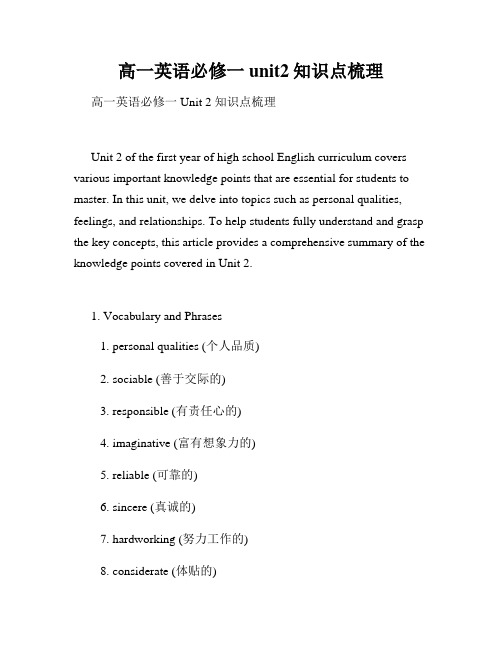
高一英语必修一unit2知识点梳理高一英语必修一Unit 2 知识点梳理Unit 2 of the first year of high school English curriculum covers various important knowledge points that are essential for students to master. In this unit, we delve into topics such as personal qualities, feelings, and relationships. To help students fully understand and grasp the key concepts, this article provides a comprehensive summary of the knowledge points covered in Unit 2.1. Vocabulary and Phrases1. personal qualities (个人品质)2. sociable (善于交际的)3. responsible (有责任心的)4. imaginative (富有想象力的)5. reliable (可靠的)6. sincere (真诚的)7. hardworking (努力工作的)8. considerate (体贴的)9. understanding (善解人意的)10. courageous (勇敢的)2. Grammar Points1. Comparative and superlative forms of adjectives (比较级和最高级形式的形容词)- Examples: "more sociable," "the most imaginative"2. Prepositional phrases of time and place (时间和地点的介词短语)- Examples: "on a sunny day," "at school"3. Verbs followed by gerunds or infinitives (动词+动名词或不定式)- Examples: "enjoy doing," "decide to do"3. Reading Comprehension1. Reading strategies (阅读策略)- Skimming and scanning- Understanding context clues2. Text analysis (文本分析)- Identifying main ideas and supporting details- Making inferences and predictions3. Vocabulary in context (上下文词汇理解)- Using context to determine meaning4. Writing Skills1. Descriptive writing (描写性写作)- Using adjectives and adverbs to create vivid descriptions- Organizing ideas and details logically5. Speaking and Listening1. Giving opinions and expressing agreement/disagreement (表达观点和赞同/不赞同)2. Effective communication strategies (有效的交流策略)- Active listening- Asking for clarification6. Cultural Awareness1. Understanding cultural differences (理解文化差异)- Personal qualities valued in different cultures- Etiquette and social normsBy reviewing and consolidating these knowledge points, students will be better prepared to understand and communicate effectively in English. It is essential to practice and apply these concepts in various contexts, both inside and outside the classroom, to enhance language proficiency.。
人教版高中英语必修第一册第二册语言知识点总结
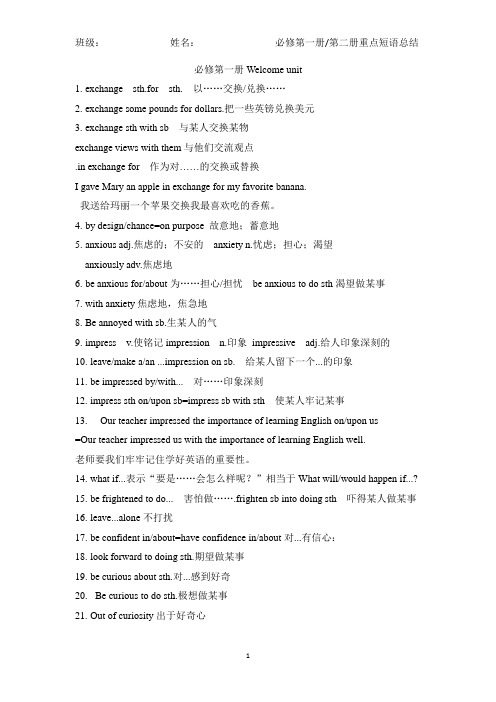
必修第一册Welcome unit1.exchange sth.for sth.以……交换/兑换……2.exchange some pounds for dollars.把一些英镑兑换美元3.exchange sth with sb 与某人交换某物exchange views with them与他们交流观点.in exchange for 作为对……的交换或替换I gave Mary an apple in exchange for my favorite banana.我送给玛丽一个苹果交换我最喜欢吃的香蕉。
4.by design/chance=on purpose 故意地;蓄意地5.anxious adj.焦虑的;不安的anxiety n.忧虑;担心;渴望anxiously adv.焦虑地6.be anxious for/about为……担心/担忧be anxious to do sth渴望做某事7.with anxiety焦虑地,焦急地8.Be annoyed with sb.生某人的气9.impress v.使铭记impression n.印象impressive adj.给人印象深刻的10.leave/make a/an ...impression on sb.给某人留下一个...的印象11.be impressed by/with... 对……印象深刻12.impress sth on/upon sb=impress sb with sth 使某人牢记某事13.Our teacher impressed the importance of learning English on/upon us=Our teacher impressed us with the importance of learning English well.老师要我们牢牢记住学好英语的重要性。
14.what if...表示“要是……会怎么样呢?”相当于What will/would happen if...?15.be frightened to do... 害怕做…….frighten sb into doing sth 吓得某人做某事16.leave...alone不打扰17.be confident in/about=have confidence in/about对...有信心:18.look forward to doing sth.期望做某事19.be curious about sth.对...感到好奇20.Be curious to do sth.极想做某事21.Out of curiosity出于好奇心Unit1 teenage life1.prefer vt.较喜欢(preferred,preferring)preference n.偏爱,优先选择①宁愿做A而不做Bprefer to do A rather than do B=prefer doing A to doing B=would do A rather than do B=would rather do A than do BEg.我宁愿做作业也不看电视I prefer to do homework rather than watch TV=I prefer doing homework to watching TV=I would do homework rather than watch TV=I would rather do homework than watch TV②喜欢A多于B Prefer A to B.2.be suitable for sth. 对……适合的be suitable to do sth适合做某事3.be content to do sth满意做某事4.feel/be content with对……感到满意5.clean up 打扫(或清除)干净6.sign up for报名参加(课程)7.get/be used to doing sth.习惯于做某事8.uesd to do sth.过去常常做某事9.be/get confused about sth.对……感到困惑10.g et confused 迷惑的11.c onfuse A with/and B 把A与B混淆12.r ecommend sb sth=recommend sth to sb向某人推荐某物13.r ecommend/suggest/advise that sb (should) do sth=recommend/advise sb to do sth 建议某人做某事14.r ecommend/suggest doing sth 建议做某事15.q uit doing sth.停止做某事quit smoking.戒烟16.b e responsible for=take responsibility for 对……负责17.a sense of responsibility责任感18.f ocus /concentrate on doing sth.集中精力做某事19.b e scheduled to do sth.按照计划做某事20.M ake the team加入团队21.22.19Unit 2 travelling around1.apply for申请apply for a visa 申请签证。
新外研版高中英语必修一Unit2ExploringEnglish知识点总结
新外研版高中英语必修一Unit2ExploringEnglish知识点总结Unit2. Exploring English重点知识点:SectionA.1、Pine n.松树2、pineapple n.菠萝3、five- year-old五岁的※“数词+名词+形容词”构成复合形容词,其中的名词用单数形式。
4、ham n.火腿5、eggplant n.茄子6、sculpt v.雕刻,雕塑7、sculpture n.雕像,雕刻品,雕塑品8、seasick adi.晕船的9、airsick adj.晕机的10、carsick adj.晕车的11、homesick adj.想家的12、speaking of谈到,说起(在句中作独立成分)13、opposing adj.(观点、意见等)相反的,相对立的14、behavior n. 举止,行为15、look out of从…向外望去16、confusing adi.令人困感的※confused adj.感到困惑的17、capitalized adj.大写的18、unique adj.独一无二的,独特的※(be) unique to对…来说是独一无二的19、burn up 烧毁,烧尽20、burn down烧毁21、alarm n.警报器;闹钟22、go off(警报器等)突然发出巨响23、reflect v显示,反映24、creativity n.创造性,创造力25、visible adj.看得见的,可见的26、wind up给(机械)上发条;使(活动、会议等)结束原文长难句分析:1、Have you ever asked yourself why people often have trouble learning English?--- why引导宾语从句,作ask的宾语※have trouble(in) doing sth.做某事有困难2、Neither is there pine nor apple in pineapple.---“Neither/Nor+助动词/连系动词be/情态动词+另一主语表示上述否定情况也适用于该主语。
新外研版高中英语必修一Unit2ExploringEnglish知识点总结
新外研版高中英语必修一Unit2ExploringEnglish知识点总结单词:1. likely adj.可能的,可能发生的;adv.很可能the most likely cause of the problem造成这个问题最有可能的的原因Rain is likely in our city today.今天我市可能下雨。
We are likely to be very busy tomorrow.明天我们可能很忙。
It will likely rain tomorrow.明天很有可能要下雨。
句型It is likely that... 意思是“可能......”,be动词也可用seem等系动词替换。
The car is likely to break down soon.=It’s likely that the car will break down soon.这车很可能马上要抛锚。
It is very likely that he will not agree.很可能他不会同意。
She may get the job, but it isn’t likely.她或许能得到那份工作,但是可能性不大。
It is/seems very likely that it will rain tomorrow.明天很有可能要下雨。
易混辨析possible,probable,likely1)表示“可能”的形容词possible的可能性最小,指客观上有可能;probable可能性最大,表示“很可能,十有八九”;likely更接近probable,表示外表迹象表明有可能。
如:It’s possible but not likely/ probable that he’ll come here next month.他下月有可能来这里,但是不很肯定。
It’s probable, not only possible.这事多半如此,不只是可能。
高一英语必修一unit2知识点
高一英语必修一unit2知识点知识给人以爱,给人以光明,给人以智慧,应该说知识就是幸福,因为有了知识,就是摸到了有史以来人类活动的脉搏,否则就不懂人类生命的音乐!下面给大家分享一些关于高一英语必修一unit2知识点,希望对大家有所帮助。
高一英语必修一unit2知识1重点词汇、短语1. because of 因为、由于2. come up 走近、上来、提出3. actually 实际上、事实上4. base 以…为基础,根基5. at present 目前6. make use of 利用7. such as 例如8. command 命令、指令、掌握9. request 请求、要求10. play a part/role in 扮演一个角色11. recognize 辨认出、承认、公认12. straight 直接、挺直、笔直的13. be different from 与…不同be the same as 和…一样14. one another 相互,彼此(=each other)15. at the end of 在…结束时16. because of 因为(后接名词或名词性短语)because 因为(后接句子)17. be based on 根据,依据18. at present 目前;当今19. especially 特别,尤其specially 专门地20. make use of 利用…make the best of 充分利用…21. a large number of 大量的,很多(作主语时,谓语动词用复数)the number of …的数量(作主语时,谓语动词用单数)22. in fact = actually= as a matter of fact 事实上23. make lists of… 列清单24. included 包括(前面接包括的对象)including包括(后面接包括的对象)25. command sb. to do sth. 命令某人去做某事command + that 从句(从句用should+V原)26. request sb. to do sth. 要求某人做某事request + that 从句(从句用should+V原)高一英语必修一unit2知识2重点句型1. World Englishes come from those countries where English plays an important role as a first or second language, either because of foreign rule or because of its special role as an international language.(定语从句)世界英语来自那些以英语为第一或第二语言的国家,英语在这些国家起重要作用,或是因为外国的统治,或是因为其作为国际语言的特殊地位。
高中英语新外研版必修一 Unit 2知识点
高中英语必修一Unit 2知识点一、重点词汇1.ham n.火腿2.eggplant n.茄子3.sculpt v.雕刻,雕塑4.sculpture n.雕像,雕刻品5.alarm n.警报器;闹钟6.subway n.地铁7.highway n.公路8.motorway n.高速公路9.gas n.汽油10.petrol n.汽油11.apartment n.一套住房,公寓套房12.flat n.一套住房,公寓套房13.elevator n.电梯,升降机14.context n.上下文,语境15.forum n.(因特网上的)论坛,讨论区16.misadventure n.事故,灾难17.frog n.蛙,青蛙18.throat n.喉咙,咽喉19.downtown adj.在城镇中心区的,在闹市区的20.boot n.靴子21.section n.区域22.exit n.出口23.wicked adj.缺德的,邪恶的;很棒的,极好的24.odd adj.奇特的,古怪的25.error n.错误,谬误26.title n.题目,标题27.unique adj.独一无二的,独特的28.type n.类型,种类29.contact v.联系,联络30.likely adj.可能的,可能发生的31.resource n.资料,(教学)资源32.remind v.提醒,使……想起33.rather adv.相当,颇ment n.评论35.actually adv.事实上,实际上36.downstairs adv.在楼下37.negative adj.消极的,负面的二、词汇拓展1.opposing adj.(观点、意见等)相反的,相对立的→oppose vt.反对;反抗;与(某人)较量→opposite adj.对面的 n.反面,对立面2.behavior n.举止;行为→behave v.行为;表现3.confusing adj.令人困惑的→confuse v.使困惑4.reflect vt.显示,反映→reflection n.反映;反射5.creativity n.创造性,创造力→creative adj.创造(性)的→create v.创造6.visible adj.看得见的,可见的→invisible adj.看不见的rmal adj.(书写或言谈)非正式的→formal adj.正式的8.unfamiliar adj.不熟悉的,不了解的→familiar adj.熟悉的anization n.组织,团体,机构→organize v.组织;安排;规划10.addition n.增加;添加→add vt.增加;添加→additional adj.额外的11.entrance n.大门(口),入口(处)→enter v.进入;参加;登记12.intend v.计划,打算→intention n.计划,打算13.recognise v.认识,辨认出→recognition n.认识;识别;承认14.base v.以……为基础→basis n.基础;基本原则;根据→basic adj.基本的,基础的15.aware adj.意识到的,明白的→awareness n.意识;认识;明白;知道三、重点词组1.have trouble (in) doing sth 做某事有困难3.in one’s free time 在某人的空闲时间4.speak of 说到,谈及6.fill in/out 填写7.go off (警报器)发出响声8.wind up 给(机械)上发条;使(活动、会议等)结束9.burn up烧毁,烧尽10.burn down烧毁e across偶然发现12.have a frog in one’s throat(尤因喉咙痛)说话困难13.be aware of意识到,察觉到四、重点句型1.Have you ever asked yourself why people often have trouble learning English?你有没有问过自己,人们学英语为什么这么费劲?2.Neither is there pine nor apple in pineapple.菠萝里面既没有松树,也没有苹果。
- 1、下载文档前请自行甄别文档内容的完整性,平台不提供额外的编辑、内容补充、找答案等附加服务。
- 2、"仅部分预览"的文档,不可在线预览部分如存在完整性等问题,可反馈申请退款(可完整预览的文档不适用该条件!)。
- 3、如文档侵犯您的权益,请联系客服反馈,我们会尽快为您处理(人工客服工作时间:9:00-18:30)。
Unit2 English around the worldLanguage points:1.include vt. 包含;包括—反义—〉exclude vt. 除去;排除e.g.a. The list included his name.b. I include eggs on the list of things to buy.adj. 包含的,包括的prep. 包含,包括included e.g. Six persons, six women included, were killed or damaged inthe road accident.+ n./pron. e.g. There are six people, including three women.区别:include, contain, hold·include:强调“包括,作为整体的一部分”,侧重范围或整体e.g.He had included a large number of funny stories in the speech. ·contain:着重“其中确实包含有”,指在一定范围或容器内容纳某物,侧重包含的内容或成分。
e.g. The bottle contains water.·hold:指“能容纳”。
e.g. a. The house hold 20 people.b. How much water does the jug hold?练习:1.The parcel _______ a lot of things, _______ a second-hand dictionary.A. contained; includedB. contained; includingC. included; containedD. included; containing2. The book _______ forty maps, ______ three of Great Britain.A. contains; includesB. is containing; includingC. includes; containsD. contains; including2.role n. 角色;任务;作用(同part)play roles扮演角色play the role/part of 扮演…角色 e.g. He will play the role of the doctor in mylatest drama.play a role/part in sth/doing sth在…发挥作用/扮演角色e.g.Phonetics plays animportant part in thestudy of English.3. because of + n./pron/宾丛 e.g.She didn’t come to the party because ofwhat you had said.because + 句子 e.g. I was late for school this morning because I overslept.同义词:·due to 由于,作表语或状语 e.g. The accident was due to careless driving. ·thanks to多亏,由于,作表语或状语e.g. Thanks to your advice, much troublewas saved.·owing to 由于,作表语或状语e.g. Tom’s failing in the exam was owing to hiscarelessness.·as a result of由于,作状语e.g.The flight was delayed as a result of fog.·on account of 因为,作状语e.g. We delayed our departure on account of the badweather.·by reason of 由于,因为,作状语e.g.He was excused by reason of his age.4. native adj.&n.①adj. a. 出生地的b. 本地的,土生土长的c. (常与to连用)本地产的A是B地特产的动物或植物:A be native to B. = A be a native of B.d.(指品质)与生俱来的,天生的②n. 本地人,本国人,某地的动物或植物e.g. a. Her native tongue is German.b. Tom is a native Englishman.c. Banana is native to Taiwan.== Banana is a native of Taiwan.d. native speakerf. He is a native of Beijing.g. Are you a native here, or just a visitor?h. The panda is a native of west China.注:One’s native place 指某人的出生地,但表达“是某地人”时,习惯上不说“My native place is …..”而说“I was born in ……”拓展:n.国家,民族national adj. 国家的,国民的n(c). 侨民n. (u) 国籍(c)民族 e.g. the minority nationalities 各少数民族5. the road to the modern Englishto 为介词,类似的有:the entrance to the hallthe answer(n.) to the question answer(v.) the questionthe key to the doora road to successa journey/trip to Beijing a visitor to Beijingthe guide to ….the notes to the textan introduction to English grammar6. not 与everything 连用表示部分否定类似的:all, both, every, whole, always, altogether, entirely, wholly 等与否定词连用,构成部分否定。
e.g. a. All is not gold that glitters.=> Not all that glitters is gold. 发光的并非都是金子。
b. All men here are not honest. 这儿的人并非都诚实。
c. Both of the brothers don’t like the film. 兄弟两不都喜欢这部电影。
d. The rich are not always happy. 有钱人并非总是幸福的。
另:①not…and 的否定,被否定的往往是and 后面的那一部分。
e.g. a. She cannot sing and dance. 她会唱歌但不会跳舞。
b. He did not speak clearly and correctly. 他讲得清楚但不正确。
注:把and 换成or, not 对其后面的两部分就全盘否定了。
e.g. a. She cannot sing or dance.她既不会唱歌也不会跳舞。
②not…as well as 只否定它前面的部分,表示部分肯定。
e.g. a. He doesn’t dance as well as sing. 他唱歌,但不跳舞。
b. The child isn’t lively as well as healthy.这个孩子健康,但不活泼。
拓展:全部否定若表示全部否定,则用①none, neither, nobody, nowhere, never etc.+肯定动词e.g. a. Nothing in the world is difficult for one who sets his mind to it.世上无难事,只怕有心人。
b. No pains, no gains.c. None of them are right. 他们都不对。
d. Neither of us will go. 我们两都不去。
e. The book is nowhere to find. 都处都找不到这本书。
②anything, anything, any other etc.+ 否定动词e.g. I cannot do any of the exercises. 任何一道题我都不会做。
7.Come upa. = to rise (太阳)升起 e.g. The sun came up.b. =to come near 走近 e.g.He came up and said hello to me.c. =to appear or happen 显现;出现e.g. The question never came up.d. (植物)长出地面拓展:come about 发生=happencome across 偶遇,碰到=come upon/meet with/run across (into)come along 进展,进步come to 苏醒;结果达到come on 来吧;赶快come into being 形成(无被动形式)come into power 上台,掌权come into usecome out 出版;开花;发芽;出现come over 过来;顺便拜访come true 实现8.actually adv. 事实上;实际上;真实地e.g.Actually, few of us will agree with him.同义词:really, in fact, as a matter of fact,in reality, in truth, in point of fact, in nature9. present n. &adj. & vt.·①n. a. =gift 礼物 e.g. a birthday giftb. 当前;目前at present=now 目前at the present time 在目前,在现在for the present = for the time being 暂时,暂且,就目前来讲up to the present =up to now 到目前为止presently=soon 不久e.g.a. I will treasure the birthday present he gave me.·②adj. a. 出席的;到场的(作后置定语或表语)be present at 出席b. 现在的;现存的(作前置定语)e.g.a. There are twenty children present.b. What is your present job?·③vt. 赠予,颁予,提出,呈递把某物给某人present sth to sb=make a present of sth to sbpresent sb with sthe.g. a. They presented flowers to their teacher.拓展:presence n. 出席;到场;存在——反义——absence n.present adj. be present at ——反义——absent adj. be absent from练习:1.__The teacher present ___(在座的老师) will have a discussion about it. 10.more…than 与其说…倒不如说 e.g. more brave than wise 有勇无谋more than 超过,不仅仅,不止e.g. It cost me more than $100.no more than 不过,仅仅,同…一样不e.g. It’s no more than a mile to the shops.no more…than …与…都不,不…也不 e.g. He is no more diligent than you .你不勤奋,他也不勤奋。
